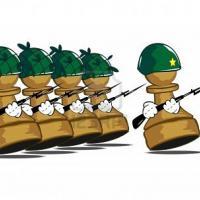
Pawns, Greed, Pins, and the Center
IMPORTANT: [At the end of the puzzles, you should click MOVE LIST so you can see my instructive notes and variations. If you are having trouble solving a problem, just click SOLUTION, and then MOVE LIST. Even if you solve everything, DO click MOVE LIST or you might miss an important bit of prose.]
DON’T FORGET THE CENTER
In the test position, Black has to choose between two logical moves. What are they and which one is best?
PIN THEM AND WIN THEM
A possible line from the game M. Elisman (1586) – A. Taylor (1880), Northshore Chess Center (90 minutes for game), 2012.
IS GREED GOOD IN CHESS?
Here White played the surprising 27.cxd5. Should Black recapture with 27...exd5 or should he take the Knight via 27...Rxb6?
THERE’S A PRICE TO PAY FOR EVERY PAWN PUSH
Mr. Robitaille said: “I’m not sure if his defense is a common one, but I felt as though I could easily push my pawn forward one more square (to d5) and make it a true thorn in his side.”
White, a beginner, didn’t know any openings, so after 1.d4 Nf6 he pushed his d-pawn to d5, taking us to the diagram. What’s wrong with this move? Aside from eating up a tempo (he could have brought out a new pawn or developed a piece), and aside from the fact that Black can batter this pawn with moves like …c7-c6 and/or …e7-e6, this advance of the d-pawn loses control over two squares: c5 and e5. One pushes their pawns to gain space and to free the pieces behind them. But one needs to show some care: every time a pawn is pushed, it actually loses its ability to control various squares.
Think about this. When the pawn stands on d2, it has the potential to control 12 squares: c3, c4, c5, c6, c7, c8, and e3, e4, e5, e6, e7, and e8. Once the pawn is pushed to d4, that potential suddenly dwindles to 8 squares (the d-pawn has permanently lost its potential to control c3, c4, e3, and e4). Nevertheless, this is okay since it’s gaining space and putting pressure on the very important central squares c5 and e5. However, even after 1.d4 White needs to be careful. Playing f2-f4 later instantly weakens the e4-square and White no longer has a pawn that can take up the slack.
Understanding the importance of advanced squares, and understanding that there’s a price to pay for every step a pawn takes, will make you a much stronger player by giving you a taste of what people mean by “weak squares,” and will also allow you to begin the long journey to truly understanding the mystery of pawns.
LESSONS FROM THESE EXAMPLES
* A strong, unassailable pawn center is a fearsome thing that gobbles up space and often leaves the defender's pieces passively placed. If your opponent is trying to build such a center, don’t allow it, or tear it down. If you are trying to build such a center, do everything you can to make it indestructible!
* Just because your opponent confidently offers a piece for two pawns and a check doesn’t mean it’s sound! Your job is to challenge everything the opponent tosses at you since, more often than not, he’ll be wrong!
* In chess, greed is often good. If someone offers you something, your first thought should be, “Can I get away with taking it? I really want to!”
* The simple but powerful pin is a basic tactical tool that every chess player needs to master.
* There’s a price to pay for every step a pawn takes, and understanding this is extremely important for a chess player's development.
HOW TO PRESENT A GAME FOR CONSIDERATION
If you want me to look over your game, send it to askjeremy@chess.com
I need your name (real or chess.com handle), your OPPONENT’S name (real or chess.com handle), both players’ ratings, where the game was played, and date. If you don’t give me this information, I won’t use your game! BTW: I’ve noticed that many people are reluctant to give me their opponent’s name. This is very strange! Showing the names of both players is the way chess games are presented in databases, books, magazines… everywhere! Permission from the opponent isn’t necessary. If permission was necessary, everyone who ever lost a game wouldn’t allow their name to be on it!






